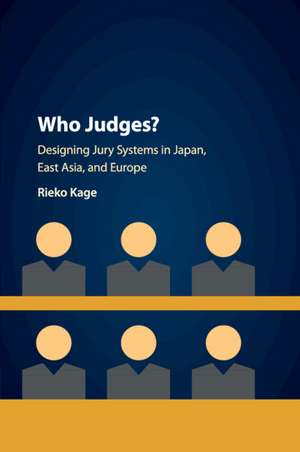Who Judges?: Designing Jury Systems in Japan, East Asia, and Europe
Autor Rieko Kageen Limba Engleză Paperback – 20 feb 2019
| Toate formatele și edițiile | Preț | Express |
|---|---|---|
| Paperback (1) | 282.49 lei 6-8 săpt. | |
| Cambridge University Press – 20 feb 2019 | 282.49 lei 6-8 săpt. | |
| Hardback (1) | 689.28 lei 6-8 săpt. | |
| Cambridge University Press – 11 oct 2017 | 689.28 lei 6-8 săpt. |
Preț: 282.49 lei
Nou
Puncte Express: 424
Preț estimativ în valută:
54.10€ • 55.74$ • 45.32£
54.10€ • 55.74$ • 45.32£
Carte tipărită la comandă
Livrare economică 24 februarie-10 martie
Preluare comenzi: 021 569.72.76
Specificații
ISBN-13: 9781108707091
ISBN-10: 1108707092
Pagini: 278
Ilustrații: 25 b/w illus. 19 tables
Dimensiuni: 150 x 230 x 15 mm
Greutate: 0.38 kg
Editura: Cambridge University Press
Colecția Cambridge University Press
Locul publicării:Cambridge, United Kingdom
ISBN-10: 1108707092
Pagini: 278
Ilustrații: 25 b/w illus. 19 tables
Dimensiuni: 150 x 230 x 15 mm
Greutate: 0.38 kg
Editura: Cambridge University Press
Colecția Cambridge University Press
Locul publicării:Cambridge, United Kingdom
Cuprins
1. Introduction; 2. Theoretical framework: participation and partisan politics; 3. The distribution of cases; 4. The history of the lay judge system debate in Japan up to 1996; 5. Bringing the lay judge system back in, 1997–2004; 6. Setting the agenda: new left-oriented parties and deliberations in the Japanese parliament; 7. Proposals for lay participation in the Republic of China; 8. Introducing jury systems in South Korea and Spain; 9. The impact of new lay judge systems; 10. Conclusions.
Recenzii
'In this meticulous and elegant book, Kage uncovers the logic of the new role for juries in the judicial systems of Japan, South Korea, Taiwan, and Spain. Her close comparisons over time and across cases allow her to understand why a country may choose to inaugurate a role for lay juries, and why and how jury systems vary. The patterns are best explained, Kage finds, by the preferences and relative power of 'new left' parties seeking to expand citizen participation in politics. This is theoretically-grounded empirical work at its best.' Frances Rosenbluth, Yale University, Connecticut
'This brilliant book offers a thoughtful, creative, and original analysis of lay participation in the criminal justice process. Kage, a rising star in the discipline of political science, is interested in understanding why a growing number of countries have invited the public to participate in criminal trials, and how such participation has influenced the power of judges and the treatment of criminal defendants. Her analysis, which focuses on Japan and includes significant research on Taiwan, Korea, and Spain, is a tour de force of comparative scholarship – historically rich, quantitatively and qualitatively sophisticated, and analytically laser-sharp. Who Judges? redefines the standard for work at the intersection of law and politics, and is indispensable reading for anyone interested in contemporary Japan, comparative politics, and public law.' Eric Feldman, University of Pennsylvania
'This book is an extremely valuable addition to global jury studies and makes a significant contribution to the sociopolitical analysis of varied democratic systems of citizen participation in criminal justice proceedings.' Hiroshi Fukurai, The Journal of Japanese Studies
'In sum, Kage's book is highly recommended especially for researchers and policymakers interested in empirically comparing law reform, politics, justice systems, or criminology, particularly in relation to Japan, but also other parts of East Asia and one part of Europe.' Luke Nottage, Asian Journal of Law and Society
'Kage's book will become a touchstone for studies of Japanese legal reform as well as for broader accounts of the politics of lay participation.' Tom Ginsburg, Social Science Japan Journal
'This brilliant book offers a thoughtful, creative, and original analysis of lay participation in the criminal justice process. Kage, a rising star in the discipline of political science, is interested in understanding why a growing number of countries have invited the public to participate in criminal trials, and how such participation has influenced the power of judges and the treatment of criminal defendants. Her analysis, which focuses on Japan and includes significant research on Taiwan, Korea, and Spain, is a tour de force of comparative scholarship – historically rich, quantitatively and qualitatively sophisticated, and analytically laser-sharp. Who Judges? redefines the standard for work at the intersection of law and politics, and is indispensable reading for anyone interested in contemporary Japan, comparative politics, and public law.' Eric Feldman, University of Pennsylvania
'This book is an extremely valuable addition to global jury studies and makes a significant contribution to the sociopolitical analysis of varied democratic systems of citizen participation in criminal justice proceedings.' Hiroshi Fukurai, The Journal of Japanese Studies
'In sum, Kage's book is highly recommended especially for researchers and policymakers interested in empirically comparing law reform, politics, justice systems, or criminology, particularly in relation to Japan, but also other parts of East Asia and one part of Europe.' Luke Nottage, Asian Journal of Law and Society
'Kage's book will become a touchstone for studies of Japanese legal reform as well as for broader accounts of the politics of lay participation.' Tom Ginsburg, Social Science Japan Journal
Notă biografică
Descriere
Who Judges? is the first book to explain why different states design their new jury systems in markedly different ways.
